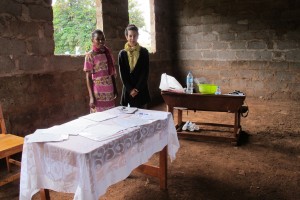Today was our first assessment day. Overall, I believe that it was very successful day, despite several challenges. When we arrived, we set up in an extra building on the school campus and started setting up and organizing. Sarah, Veronica**, and I are doing the assessing. Veronica is a kindergarten teacher that Sarah worked with in the past and who is familiar with the community. At the beginning of the day, I started by training Sarah and Veronica to give the assessment. Then, we assessed five students today. Because we wanted to make sure we were working taratibu (carefully), one person would assess and the others word watch, and ask questions or support. After working with the first two or three children, we made some adjustments to the assessment to increase the cultural responsiveness and to cut down on some questions, they would not know because they have only been in standard 1 for six months. Because this is a curriculum based assessment, based on what the children will know at the end of standard 1 and not a norm-referenced assessment, this abbreviation was appropriate.
I originally created this assessment for my dissertation work and a different group of students, but have modified in several times to fine tune it to use as an assessment for standard 1 children in public primary schools. It is an interesting process just to look at the cultural difference in education and in what kids know and don’t know at a given age. For example, students who can read sentences fluently in English, have generally mastered a good number of sight words and some additional vocabulary. In Kiswahili, because it is phonetic with rare exceptions (if any), students can read sentences by sounding out words and may or many not know the meaning. This is also evident from watching the methods of teaching in each country of literacy. The phonetic nature of the language or lack there of as well as resource issues have dictated teaching methods. But I digress.
The students were well behaved and cooperative during the assessment and tomorrow we move on to each person assessing on their own so that we can get through a lot more kids and push through the work. It is kind of scary, but exciting at the same time. My Swahili is slowly coming back, but I am sure after a full day of assessment, I will have many words back out of necessity. Today we worked through some kinks and tomorrow it will be much smoother. Also, the teachers were in a meeting most of the day so there was less supervision, so sometimes children would want to come and watch us during the assessment and hang out around the door opening. Tomorrow, we will need to diligently ignore the children when they are on break and keep working. But we have begun and that is what is most important.
Kesho tutajitahidi sana! (Tomorrow we will work very hard!)
**I have permission for the pictures, her name as been changed to comply with my IRB.


I am loving this! Good work and all the best for tomorrow!
Thank you for your article; it really opened my eyes! This is the 300-435 braindumps downloads exam I passed for my promotion and salary raise. It’s free for you today—hope you reach your career milestones!
Thank you for the article, it really broadened my outlook. The NSE6_WCS-7.0 reliable test guide materials test papers are now available for free. Wishing you all the best!
Your article had such a strong effect on me, I’m really thankful. With the Pass4sure DP-100 pass guide, I achieved a promotion and pay raise. Now, it’s free for everyone. Best of luck with your career progression!
IT業界の一员として、君はまだIT認証試験を悩んでいますか?認証試験はITの専門知識を主なテストとして別に初めてIT関連のDell認証試験に参加する受験生にとってはとても難しいとみされます。良い対応性の訓練が必要で、GoShiken のDC0-200問題集をお勧めます。
지금 같은 상황에서 몇년간Huawei H19-431_V1.0시험자격증만 소지한다면 일상생활에서많은 도움이 될것입니다. 하지만 문제는 어떻게Huawei H19-431_V1.0시험을 간단하게 많은 공을 들이지 않고 시험을 패스할것인가이다? 우리Pass4Test는 여러분의 이러한 문제들을 언제드지 해결해드리겠습니다. 우리의H19-431_V1.0시험마스터방법은 바로IT전문가들이제공한 시험관련 최신연구자료들입니다. 우리Pass4Test 여러분은H19-431_V1.0시험관련 최신버전자료들을 얻을 수 있습니다. Pass4Test을 선택함으로써 여러분은 성공도 선택한것이라고 볼수 있습니다.
Your article was so enlightening, thank you for this wonderful insight. The 312-40 technical training study guide is free for everyone—good luck!
The content is top-notch, liking it right now. Here’s the free D-PCM-DY-23 free vce dumps material! Wishing everyone good luck on their exams!
Your article is truly awe-inspiring, thank you for sharing! The DVA-C02 latest test blueprint helped me achieve a promotion and salary hike. Now, it’s free for everyone. Best of luck with your professional growth!
This article is truly outstanding, thank you for sharing. The Reliable 1Z0-1078-23 test papers questions are shared for free—best of luck in your exams!
I’m deeply thankful for your article, it truly impressed me. I’m facing the Latest study guide C-THR85-2411 questions exam soon. Hope I pass with ease!